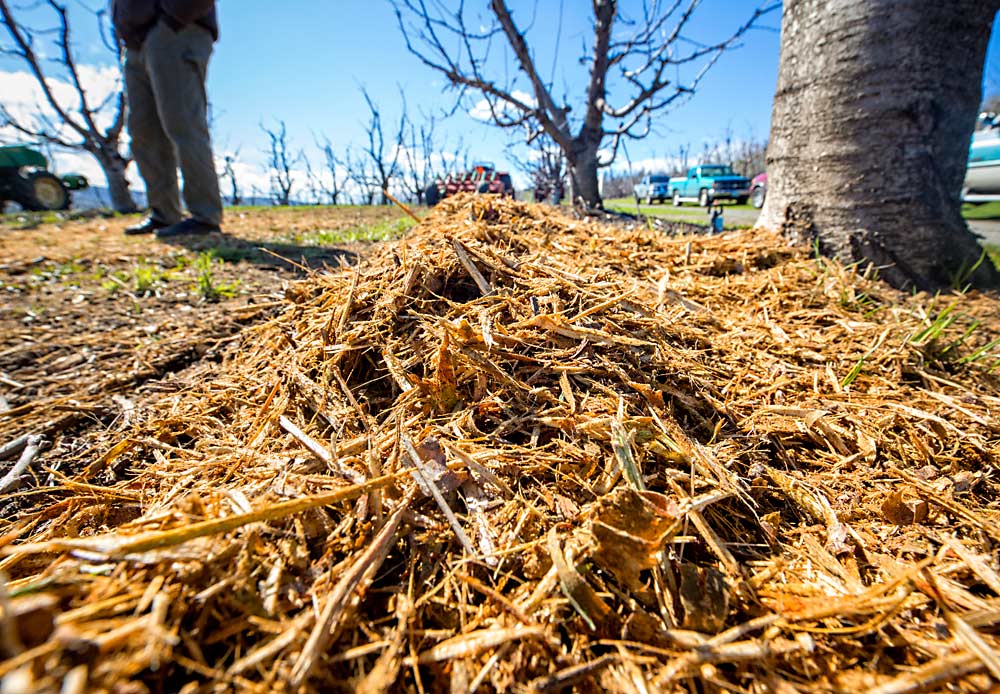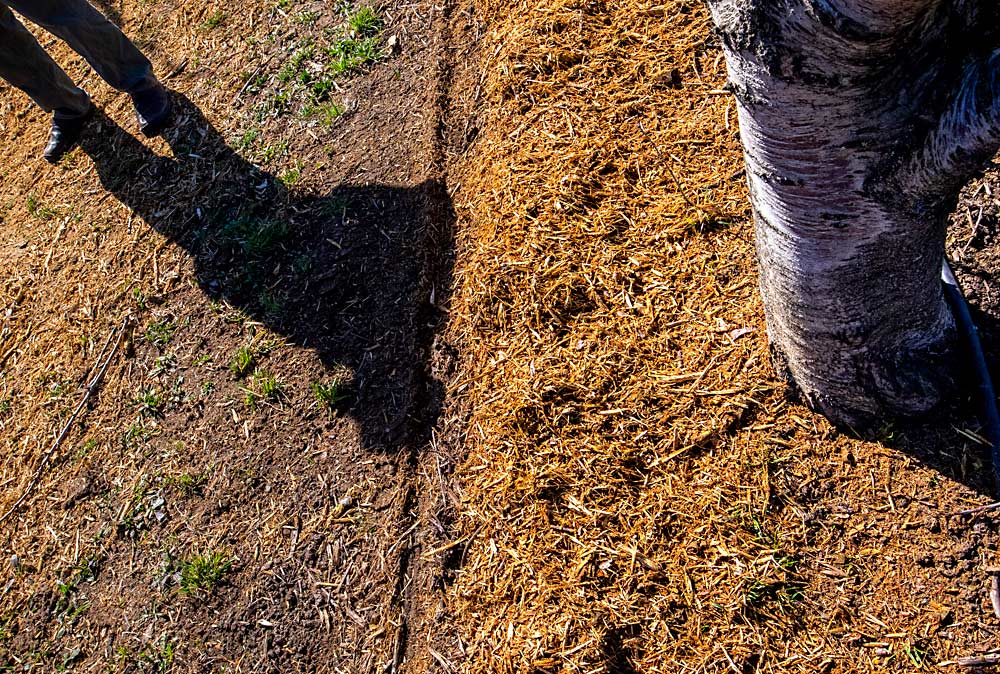
Early results of a trial where mulch was applied to an Oregon cherry orchard found the application did not increase yield, packout, fruit size, fruit quality or leaf nitrogen — at least in the first two years.
However, the mulch did significantly increase organic matter, and as the mulch breaks up over time, it may improve the biology of both trees and fruit, according to Oregon State University Extension specialist Ashley Thompson, one of the researchers on the study.
“This isn’t going to happen overnight, if you decide to apply mulch. You have to be a patient person, which can be difficult,” Thompson said at a Cherry Fruit School hosted by OSU and Washington State University for Northwest cherry growers in March. “Choose an orchard management system that’s easy to follow and maintain. But also, think about the long term: How can we take care of the soil? Please, don’t treat your soil like dirt.”
More and more, growers are wondering how best to manage soil on the orchard floor, which can be really tricky given the myriad difficult decisions growers must make in the orchard, she said.
They need the systems and processes they choose to be uncomplicated and sustainable, and there are plenty of things growers can do to improve the quality of life in their environment, or more specifically, the soil. Among them: weed-free strips, cover crops, inorganic mulches such as geotextile or film covers, and organic mulches.
In this study, researchers focused on carbon-based, or organic, mulches, which can include compost wood chips, straw, newspaper, manure and cover crops.
Adding soil organic matter to the system creates more energy for microorganisms, and they can use that to release plant nutrients, such as nitrogen, enhancing plant growth.
But there are other benefits: improved soil structure, increased nutrient and water-holding capacity, increased water infiltration, buffered soil temperature and reduced erosion.
Research on bark mulches, mostly on apples, has shown the mulch increases organic matter and tree growth pretty consistently. But the mulches can also increase yield, though that can be inconsistent, which is a problem, she said.
Her own research has shown that increases in yield tend to be dependent on soil texture, with less of an increase in heavier clay soils — likely because those soils already have a lot of nutrients and may not change much with applications of compost or mulch — and more of an increase in sandy, loamy or finer soil.

The study initiated by OSU’s Lynn Long, Washington State University researcher David Granatstein, and cherry grower Mike Omeg in The Dalles, Oregon, wanted to see how mulch affects yield and fruit quality in a mature sweet cherry orchard, including packout, cherry size and flesh firmness. The study also is examining how mulch affects soil quality — physical, chemical and biological factors.
In a Skeena orchard on Mazzard rootstocks, researchers applied four different treatments to an entire tree row in four blocks and four replications: a weed-free strip, an orchard mulch compost, biointensive foliar products with orchard mulch compost, and a standard nutrition program.
However, Thompson limited results in the talk to comparing the weed-free strip and mulch treatments. (Mulch was applied once at a 4- to 5-inch application.)
The results showed no statistical difference in packouts between the weed-free strip and the mulch. Row size did not significantly improve with mulch. Fruit firmness actually decreased with mulch, while soluble solids and sugars did not change. There also was no reduction in leaf nitrogen, she said.
“Leaf nitrogen is indicative of how well your tree is growing,” she said. “Mulches can sometimes pull nitrogen away from your trees, so it’s not negatively impacting the overall health of the tree.”
Mulching also increased water infiltration, though it did not increase cation exchange capacity, the soil’s ability to hold on to nutrients, “which is weird, because you usually see that associated with increases in organic matter,” Thompson said.
The additional soil organic matter is shown to be very important for water retention — key to growers, because water must be able to move through the soil. “You don’t want water to be sitting on your soil, so having faster infiltration is typically good,” she said. “Water spent a lot less time sitting on the surface in that mulch treatment, compared to the weed-free strip.”
Overall, for the soils in The Dalles region, 2.5 percent is a reasonable amount of soil organic matter; the study showed it jumped 1 percent with the mulch application, “a significant increase.”
To keep the same rate, growers would probably have to apply mulch every two to three years. But to fully examine the results on mature trees, the study would need to continue for at least five years, she said. Researchers plan to ask for continued funding for the project.
A final note: One grower asked whether mulch or chips could carry diseases such as little cherry or Western X. However, both require a living host, she said. “If you buy compost and it is plant matter, it’s been composted at such a high temperature that it will kill off those diseases.” •
—by Shannon Dininny






Leave A Comment